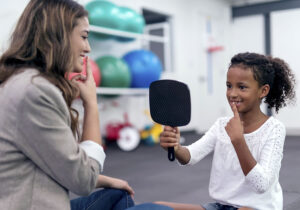Whether you are headed on a road-trip or just stuck in traffic, time in the car with kids can be challenging. Although it is so tempting to hand off your phone or tablet to your little ones for easy entertainment, it can also be the perfect opportunity for language-based activities. Language-based activities can teach turn-taking, increase vocabulary skills, teach social skills, and improve critical-thinking skills which are essential to academic success! We have put together ten language-based games that are perfect for entertainment in the car!
1. I Spy
This game is wonderful for increasing vocabulary and comprehension and use of descriptors. Pick an object you can see and say “I spy with my little eye something that is…”. You and your child can take turns picking an object in view, describing it briefly and seeing if the other one can guess it. This game is great for all ages as it teaches colors, shapes, and categories for younger kids and can be made more complex for older children.
2. Categories
Give your child a category and have them spot three items that belong to that category. Examples include things that fly, fast food restaurants, things that are yellow, things that are round…there are unlimited options to keep them engaged and excited! You can also switch roles and let them name the category or make teams to see who can find the items first. Playing a category game not only increases expressive language and comprehension of descriptors, but also teaches organization skills by grouping items together.

3. Rhyme Time
Rhyming is a very critical phonological awareness skill that leads to increased ability to decode words and improved reading comprehension at later ages. In the car, you can name select a word and then take turns generating a word that rhymes with the target word. See how many rounds you can go before you are out of rhymes!
4. Twenty Questions
Think of a noun and then have your child ask questions to identify what you are thinking of. Is it alive? Does it move? Is it big? What is it used for? What category does it belong to? The goal is to guess the item in twenty questions or less. Again, this is a great opportunity for boosting expressive vocabulary, organization, and identifying descriptors of objects. You can also switch roles on this game and make teams too!
5. Alphabet Spotting
See if you can spot the letters of the alphabet on signs, license plates, billboards, etc. Start with “A “and see how far you can go before reaching your destination. You can target uppercase, lowercase, or both! This teachers letter identification.
6. Would You Rather?
This is a fun game for all ages! Offer two options and have your child pick one and explain why that was their choice. Would you rather take a bath in a tub full of Skittles or M&M’s? Would you rather hold a spider or a snake? Would you rather camp in a tent or an RV? The options are endless and can get as silly as you’d like! This game increases verbal reasoning and problem-solving skills.
7. Word Associations
Start by naming a noun and the next person has to say a related word. For example, the first person may say “apple,” and the next may say “tree,” and the next may say “leaf,” etc. Go until a word is repeated or a player is stuck! This is great for associations, as well as how items are the same or different.
8. Who Am I
Pick a famous person, cartoon character, animal or family member. Describe your selection while your child guesses who you have selected. For example, if you selected cow, you may say I live on a farm, I eat grass, I say moo, etc. Take turns selecting and guessing. This teaches deductive reasoning, categorization, and description skills.

9. Don’t Say It!
Pick a word (or two, or five!) that no one in the car can say until the trip is over. Find creative ways to use synonyms etc. to “talk around” your selected word. Last person standing who has not said the word, wins! When the game is over, pick a new word and start again!
10. I’m going on a Picnic
This game starts out with the first person saying “I’m going on a picnic and I’m packing a ____.” The next player then repeats the sentence, listing what the first person said and adding a new item. This goes back and forth until someone forgets an item or cannot remember. See how many turns you can get in before the game is over! This game is great for verbal memory skills and auditory processing.





